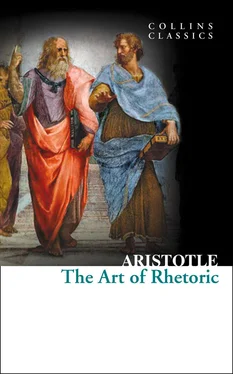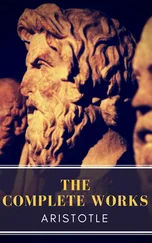Something I fain would say to thee,
Only shame restraineth me,
Sappho wrote:
If for things good and noble thou wert yearning,
If to speak baseness were thy tongue not burning,
No load of shame would on thine eyelids weigh;
What thou with honour wishest thou wouldst say.
Those things, also, are noble for which men strive anxiously, without feeling fear; for they feel thus about the good things which lead to fair fame. Again, one quality or action is nobler than another if it is that of a naturally finer being: thus a man’s will be nobler than a woman’s. And those qualities are noble which give more pleasure to other people than to their possessors; hence the nobleness of justice and just actions. It is noble to avenge oneself on one’s enemies and not to come to terms with them; for requital is just, and the just is noble; and not to surrender is a sign of courage. Victory, too, and honour belong to the class of noble things, since they are desirable even when they yield no fruits, and they prove our superiority in good qualities. Things that deserve to be remembered are noble, and the more they deserve this, the nobler they are. So are the things that continue even after death; those which are always attended by honour; those which are exceptional; and those which are possessed by one person alone – these last are more readily remembered than others. So again are possessions that bring no profit, since they are more fitting than others for a gentleman. So are the distinctive qualities of a particular people, and the symbols of what it specially admires, like long hair in Sparta, where this is a mark of a free man, as it is not easy to perform any menial task when one’s hair is long. Again, it is noble not to practise any sordid craft, since it is the mark of a free man not to live at another’s beck and call. We are also to assume when we wish either to praise a man or blame him that qualities closely allied to those which he actually has are identical with them; for instance, that the cautious man is cold-blooded and treacherous, and that the stupid man is an honest fellow or the thick-skinned man a good-tempered one. We can always idealize any given man by drawing on the virtues akin to his actual qualities; thus we may say that the passionate and excitable man is ‘outspoken’; or that the arrogant man is ‘superb’ or ‘impressive’. Those who run to extremes will be said to possess the corresponding good qualities; rashness will be called courage, and extravagance generosity. That will be what most people think; and at the same time this method enables an advocate to draw a misleading inference from the motive, arguing that if a man runs into danger needlessly, much more will he do so in a noble cause; and if a man is open-handed to any one and every one, he will be so to his friends also, since it is the extreme form of goodness to be good to everybody.
We must also take into account the nature of our particular audience when making a speech of praise; for, as Socrates used to say, ‘it is not difficult to praise the Athenians to an Athenian audience.’ If the audience esteems a given quality, we must say that our hero has that quality, no matter whether we are addressing Scythians or Spartans or philosophers. Everything, in fact, that is esteemed we are to represent as noble. After all, people regard the two things as much the same.
All actions are noble that are appropriate to the man who does them: if, for instance, they are worthy of his ancestors or of his own past career. For it makes for happiness, and is a noble thing, that he should add to the honour he already has. Even inappropriate actions are noble if they are better and nobler than the appropriate ones would be; for instance, if one who was just an average person when all went well becomes a hero in adversity, or if he becomes better and easier to get on with the higher he rises. Compare the saying of lphicrates, ‘Think what I was and what I am’; and the epigram on the victor at the Olympic games,
In time past, bearing a yoke on my shoulders,
of wood unshaven,
and the encomium of Simonides,
A woman whose father, whose husband, whose
brethren were princes all.
Since we praise a man for what he has actually done, and fine actions are distinguished from others by being intentionally good, we must try to prove that our hero’s noble acts are intentional. This is all the easier if we can make out that he has often acted so before, and therefore we must assert coincidences and accidents to have been intended. Produce a number of good actions, all of the same kind, and people will think that they must have been intended, and that they prove the good qualities of the man who did them.
Praise is the expression in words of the eminence of a man’s good qualities, and therefore we must display his actions as the product of such qualities. Encomium refers to what he has actually done; the mention of accessories, such as good birth and education, merely helps to make our story credible – good fathers are likely to have good sons, and good training is likely to produce good character. Hence it is only when a man has already done something that we bestow encomiums upon him. Yet the actual deeds are evidence of the doer’s character: even if a man has not actually done a given good thing, we shall bestow praise on him, if we are sure that he is the sort of man who would do it. To call any one blest is, it may be added, the same thing as to call him happy; but these are not the same thing as to bestow praise and encomium upon him; the two latter are a part of ‘calling happy’, just as goodness is a part of happiness.
To praise a man is in one respect akin to urging a course of action. The suggestions which would be made in the latter case become encomiums when differently expressed. When we know what action or character is required, then, in order to express these facts as suggestions for action, we have to change and reverse our form of words. Thus the statement ‘A man should be proud not of what he owes to fortune but of what he owes to himself’, if put like this, amounts to a suggestion; to make it into praise we must put it thus, ‘Since he is proud not of what he owes to fortune but of what he owes to himself.’ Consequently, whenever you want to praise any one, think what you would urge people to do; and when you want to urge the doing of anything, think what you would praise a man for having done. Since suggestion may or may not forbid an action, the praise into which we convert it must have one or other of two opposite forms of expression accordingly.
There are, also, many useful ways of heightening the effect of praise. We must, for instance, point out that a man is the only one, or the first, or almost the only one who has done something, or that he has done it better than any one else; all these distinctions are honourable. And we must, further, make much of the particular season and occasion of an action, arguing that we could hardly have looked for it just then. If a man has often achieved the same success, we must mention this; that is a strong point; he himself, and not luck, will then be given the credit. So, too, if it is on his account that observances have been devised and instituted to encourage or honour such achievements as his own: thus we may praise Hippolochus because the first encomium ever made was for him, or Harmodius and Aristogeiton because their statues were the first to be put up in the market-place. And we may censure bad men for the opposite reason.
Again, if you cannot find enough to say of a man himself, you may pit him against others, which is what Isocrates used to do owing to his want of familiarity with forensic pleading. The comparison should be with famous men; that will strengthen your case; it is a noble thing to surpass men who are themselves great. It is only natural that methods of ‘heightening the effect’ should be attached particularly to speeches of praise; they aim at proving superiority over others, and any such superiority is a form of nobleness. Hence if you cannot compare your hero with famous men, you should at least compare him with other people generally, since any superiority is held to reveal excellence. And, in general, of the lines of argument which are common to all speeches, this ‘heightening of effect’ is most suitable for declamations, where we take our hero’s actions as admitted facts, and our business is simply to invest these with dignity and nobility. ‘Examples’ are most suitable to deliberative speeches; for we judge of future events by divination from past events. Enthymemes are most suitable to forensic speeches; it is our doubts about past events that most admit of arguments showing why a thing must have happened or proving that it did happen.
Читать дальше












